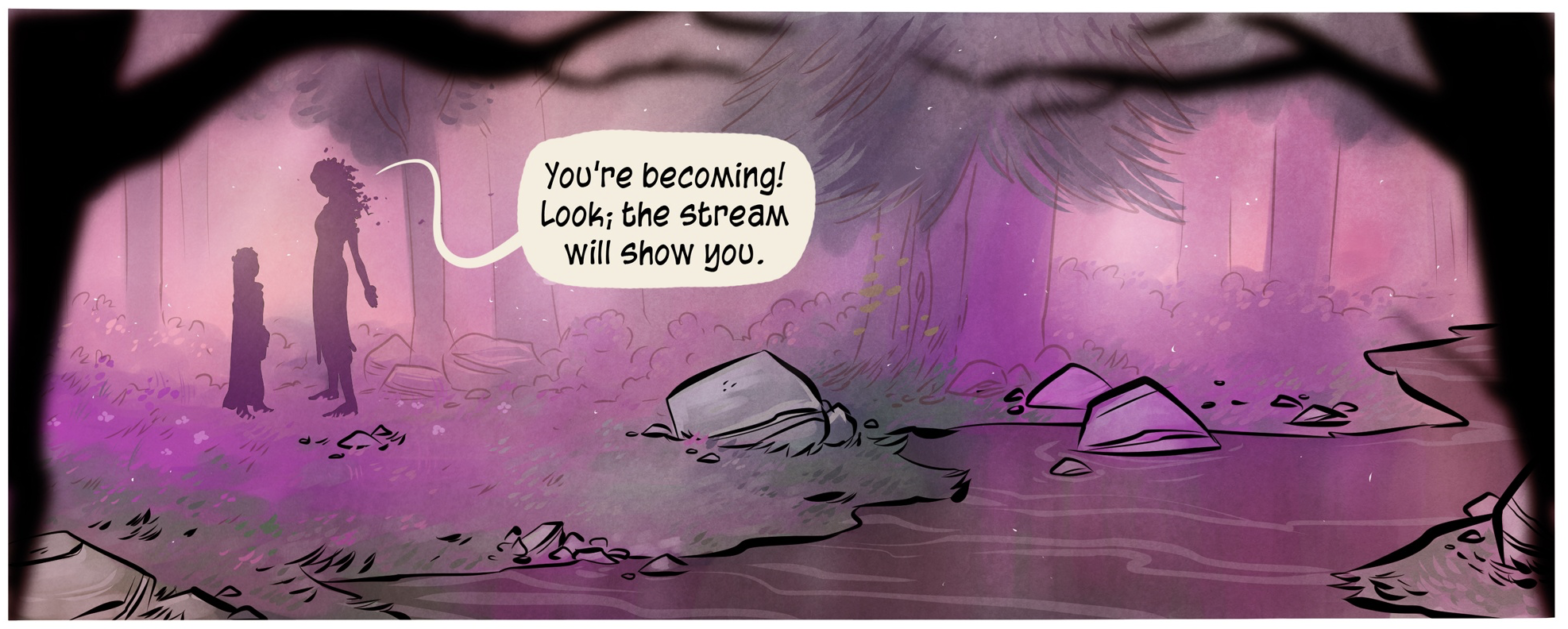I was rereading the Penny Arcade Eyrewood comics, and… I’m not sure this is the first time I’ve read “The Tithe” since I learned one of Jerry Holkins’ daughters is trans, but to me (a cis person and a parent) it suddenly hit super hard that this comic was written by the parent of a trans girl.
I feel like I’m right on, if not over, the edge of drawing a fairly dumb equivalence between coming-of-age narratives in general and transition stories; I’m not widely read in LGBTQ+ fiction or theory. But the piece of it that resonated most to me is the fact that Hanna has to leave her family and enter the Eyrewood to do what she is doing. (The name “Hanna” appears only when she is in the midst of her transformation, spoken in the wild, by the wild — by the only character in the story that claims her as a daughter. I could go on.) Hanna’s parents’ attitude toward her is ambiguous in the story — do they want her to stay home, or do they want her to become what she is? And I think the ambiguity is its own argument: It doesn’t matter what they think. One way or the other, she has to go.
“The Tithe” was published in 2013, which I’m pretty sure is a while before Holkins’ daughter transitioned. It seems pretty likely it’s not about her in particular. What this all is, from me, is just another wave of preemptively missing my kids: Of the certain knowledge that I won’t be there for some of the most important things they do and decisions they make, and that not only is that inevitable, it is almost certainly correct.
— this is reposted from a closed, artisanal social network, on which I am connected to a few trans folks. One of the interesting responses I got to this little observation was that the “dumb equivalence” between coming of age and transition is actually a way to think about transition that’s in opposition, at least in part, to a framework that’s more along the lines of “born this way.” Paraphrasing: My correspondents preferred the “coming of age” framing because it acknowledges the elements of active choice and contingency; their transition wasn’t inevitable, it was the product of circumstances and very painful effort, and it could have gone another way.
This sounds like I am patting myself on the back for being smart about trans matters, which is the opposite of my intention: This observation actually made me feel a little stupid, because I hadn’t really thought about how different concepts of transition might affect trans folks’ feelings of agency in and responsibility for their own transitions. (And to be clear, I’m not trying to canonize these couple of Internet friends of mine as the Good Concepts of Transition Deciders; the point is, again, to highlight a diversity of viewpoints among trans folks that I, a cis, was not really aware of.)
Currently reading: HORROR MOVIE, by Paul Tremblay.
If you’ve already read BRIMSTONE SLIPSTREAM and WINDBURN WHIPLASH, you should know that I’ve got a free preview up for the next book in the Streets of Flame series, HEATSTROKE HEARTBEAT! This’ll only be around until the book is published, though, so pick it up now if you’re interested.

